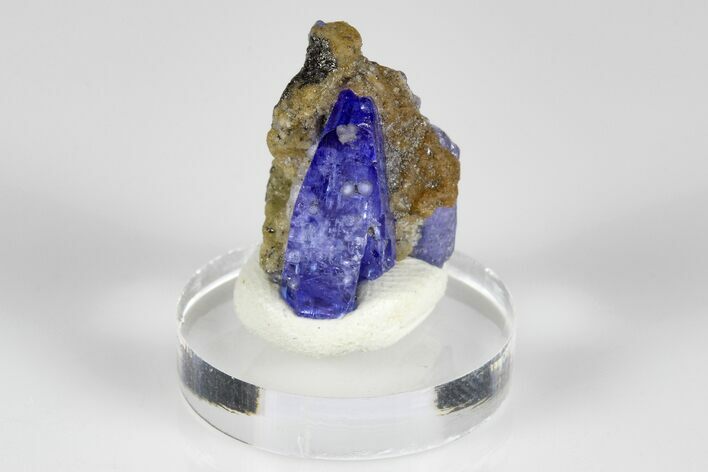This Specimen has been sold.
.8" Tanzanite Crystals, Calcite and Graphite Association - Tanzania
This is a gorgeous association of tanzanite, graphite and calcite that was collected from the Merelani Hills in the Manyara Region of Tanzania. The tanzanite crystals exhibit a brilliant blue color from one angle and a violet color from another. The entire specimen measures .8 x .6" and the largest tanzanite crystal is .63 x .28".
It has been mounted to an acrylic display base with mineral tack.
It has been mounted to an acrylic display base with mineral tack.
About Tanzanite
Tanzanite is a striking blue-violet variety of zoisite, renowned for its vibrant color, which results from vanadium substituting within the zoisite crystal structure. This unique gemstone is found exclusively in the Arusha and Manyara regions of Tanzania, the country for which it’s named. Revered in the gemstone community, tanzanite is celebrated for its captivating hue and its pleochroic property, which allows it to display different colors when viewed from various angles. Before faceting, gem cutters carefully assess this pleochroism to ensure that the stone is cut at an angle that maximizes its vivid blue-violet color. However, due to its relative softness, tanzanite is more suited for certain types of jewelry where it won’t be subject to daily wear.
Zoisite, the mineral family to which tanzanite belongs, is part of the epidote group and has the chemical formula Ca₂Al₃(SiO₄)(Si₂O₇)O(OH) (calcium aluminum hydroxy sorosilicate). This mineral appears in various colors, including green, pink, brown, yellow, gray, white, blue, purple, and colorless. Each color results from different ion substitutions within the crystal lattice; for instance, thulite is a pink variety of zoisite, colored by manganese substituting for calcium within the structure. Originally known as saualpite, zoisite offers a fascinating variety of colors and forms in the mineral world.
Tanzanite is a striking blue-violet variety of zoisite, renowned for its vibrant color, which results from vanadium substituting within the zoisite crystal structure. This unique gemstone is found exclusively in the Arusha and Manyara regions of Tanzania, the country for which it’s named. Revered in the gemstone community, tanzanite is celebrated for its captivating hue and its pleochroic property, which allows it to display different colors when viewed from various angles. Before faceting, gem cutters carefully assess this pleochroism to ensure that the stone is cut at an angle that maximizes its vivid blue-violet color. However, due to its relative softness, tanzanite is more suited for certain types of jewelry where it won’t be subject to daily wear.
Zoisite, the mineral family to which tanzanite belongs, is part of the epidote group and has the chemical formula Ca₂Al₃(SiO₄)(Si₂O₇)O(OH) (calcium aluminum hydroxy sorosilicate). This mineral appears in various colors, including green, pink, brown, yellow, gray, white, blue, purple, and colorless. Each color results from different ion substitutions within the crystal lattice; for instance, thulite is a pink variety of zoisite, colored by manganese substituting for calcium within the structure. Originally known as saualpite, zoisite offers a fascinating variety of colors and forms in the mineral world.
SPECIES
Zoisite var. Tanzanite, Calcite & Graphite
LOCATION
Merelani Hills, Lelatema Mountains, Manyara Region, Tanzania
SIZE
.8 x .6" Entire specimen, Largest tanzanite .63 x .28"
CATEGORY
SUB CATEGORY
ITEM
#178322
 Reviews
Reviews















